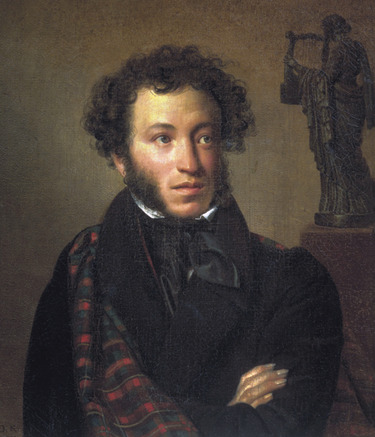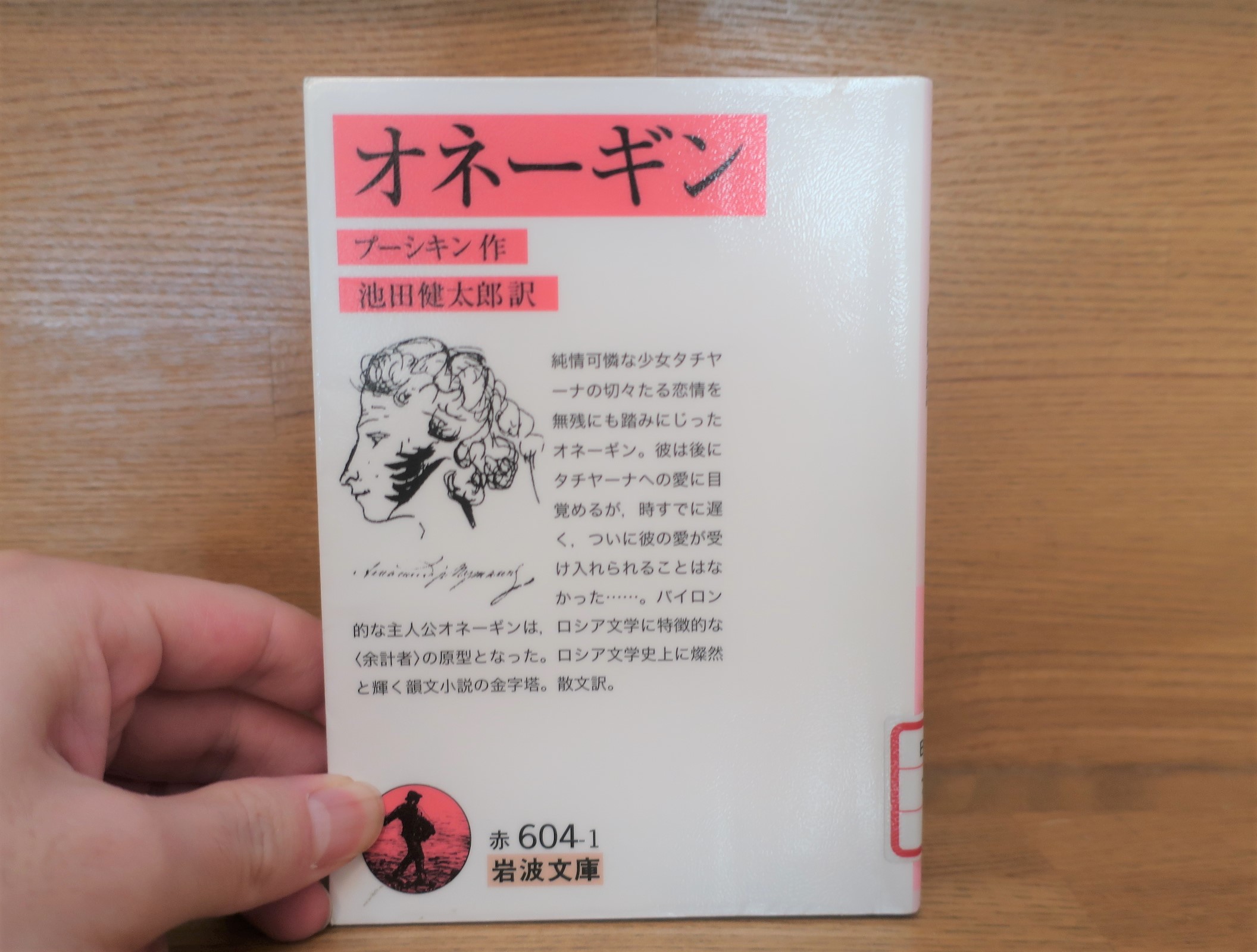Overview and synopsis of Pushkin's masterpiece "Evgenii Onegin"

Evgenii Onegin was written by Pushkin between 1823 and 1831, and published gradually between 1825 and 1832.
This work is considered the pinnacle of Russian literature and is Pushkin's masterpiece, which had a profound influence on later Russian writers.
I read "Onegin" translated by Kentaro Ikeda from the Iwanami Bunko.
Let's take a quick look at the book.
Onegin cruelly tramples on the sincere love of Tatyana, a pure-hearted and lovely girl. He later awakens to his love for Tatyana, but it is already too late, and his love is never accepted. ...... Onegin, the Byronic hero, became the prototype of the "extraordinaire" characteristic of Russian literature. A brilliant milestone in the history of Russian literature in rhymed fiction. Prose translation.
AmazonProducts Page.
It is difficult to understand Byronic, so Iwanami Bunko version PushkinThe Queen of Spades: A Beelkin Tale.I will continue to quote from the explanation of this phrase in the following section.
Byron's song is, so to speak, the fluttering of a bird of prey in the bloody scorched earth of Western Europe after the fall of Napoleon. No one at the time could have discerned its true identity, but it is true that people were deeply moved by the eerie fluttering of its wings.
Especially in Russia, it came to be called Byronism, a name that even covered the entire current of romanticism.
Rebellion against fate, devilish ego-supremacism, and exoticism (or more precisely, Eastern taste) as a natural consequence of escape from social causation were, of course, its basic characteristics, but the great characteristic of Byronism in Russia, in particular, was that it was concretely linked to the December Party movement as a principle of innovation that would blow away the political depression of many years. The great characteristic of Byronism in Russia, however, was its concrete connection with the December Party movement as a principle of innovation that overturned the political depression that had prevailed for many years.
In fact, there was not a single young officer in a leadership position in this secret society who was not more or less a Byron enthusiast, and the nature of Byron's influence on Pushkin was no exception. And the nature of Byron's influence on Pushkin was no exception.
Pushkin, The Queen of Spades, A Tale of Beelkin, translated by Kiyoshi Kannishi, Iwanami Bunko, p. 268
Some line breaks have been made.
Dostoevsky also read Byron as a young man. So this was a phenomenon that goes back to Pushkin's time. It is also interesting to note the influence of the English poet Byron on Russian literary figures.
Now, I would like to quote another synopsis from "A History of Russian Literature" written by Kaori Kawabata, a Russian literature scholar. This one gives a more detailed synopsis of "Onegin," so let's read it.
The rhymed novel Evgenii Onegin (1823-31, published 1825-32) is Pushkin's masterpiece.
Despite his intelligence and ability, Onegin is disillusioned with real life and leads a high nomadic life in the capital city of Petersburg, but when he inherits his uncle's estate, he comes to live in the countryside. Tatyana, the daughter of the landowner, falls madly in love with Onegin, but he treats her coldly, kills her friend Lenskij, who is engaged to Tatyana's sister, in a duel, and leaves the village.
A few years later, he meets Tatjana, now the wife of a general in the capital, and this time he is infatuated and confesses his love, but Tatjana reasonably shuns him.
This work is a love story between Onegin, a "superfluous man" who cannot make the most of his life in society, and Tatyana, a romantic idealist and a strong woman with her feet on the ground (the conflict between weak men and strong women has been a major theme in Russian novels since then, including Turgenev's), and both of them end up being unhappy. Although it is a love story, it succeeds in depicting Russian society between 1810 and 1830 on a grand scale that could be called a national epic.
Kawabata Kaori, History of Russian Literature, Iwanami Shoten, p. 131
Some line breaks have been made.
Thoughts - From a Dostoevskyian Perspective
Evgenii Onegin is Pushkin's masterpiece and one of the greatest works in the history of Russian literature.
This work had a great influence on Dostoevsky, and the previous articleDostoevsky loved Pushkin. What is the legendary Pushkin lecture?"As mentioned in the previous section, the central theme of Pushkin's lectures in his last years was also this "Evgenii Onegin".
And this work is still loved by Russians, not only in 19th century Russia, but even today, as my Russian class teacher said, "Pushkin is everything to us. He is truly wonderful. The heart of the Russian people is in his poetry," she said.
As if to confirm this, he recited the famous "Tatyana's Letter" from "Evgenii Onegin". He could easily come up with it without looking at anything.
I was surprised to learn that it is so familiar to Russians.
Pushkin's greatness lies in the fact that he has sublimated the story into an art form by putting it into rhyming form with the beautiful rhythms and sounds of the Russian language. Until then, the Russian language was considered inferior as an art form because the upper classes in Russia had all been speaking French.
And it was Pushkin who broke out of this situation.
In Kaori Kawabata's "History of Russian Literature," it is stated as follows.
What characterizes Pushkin's work - whether poetry, fiction, or criticism - is the naturalness, clarity, simplicity, and wit of the narrative. Although colloquial elements are boldly incorporated, the classical refinement and elegance are not lost. Unfortunately, these qualities are often lost in translation. Mérimée, who was a great admirer of Pushkin's poetry, laments that his countrymen see Pushkin only as a flat, stilted poet when he passes through translation. The perfect connection between sound and meaning, the harmony of melodious sounds and images, are characteristics of Pushkin's poetry that are difficult for foreigners to appreciate.
Kawabata Kaori, History of Russian Literature, Iwanami Shoten, p. 128
This is the difficult part of foreign poetry. Pushkin's poetry is most beautiful when heard by Russians in Russian.
This is the same for Shakespeare in England, Hugo in France, and Goethe in Germany.
Perhaps the same is true in Japan for waka and tanka poems, haiku, and classics such as "The Tale of the Heike". I am sure that the splendor of these works and the feeling they give to Japanese people are not easily understood by foreigners who do not speak Japanese as their mother tongue.
Pushkin had completed a poem that resonated perfectly with the Russian people in exactly the same way. It was "Evgenii Onegin.
The Japanese translation of the story itself is very interesting, but for Russians who read it in Russian, they must have experienced an emotion that far surpasses ours.
Dostoevsky was surely one of them. That is why he respected Pushkin throughout his life and risked his life for Pushkin's lectures in his last years.
Evgenii Onegin", a very important work for understanding Russia.
The above is a synopsis of Pushkin's masterpiece "Evgenii Onegin".
Next Article.
Click here to read the previous article.
Related Articles





































